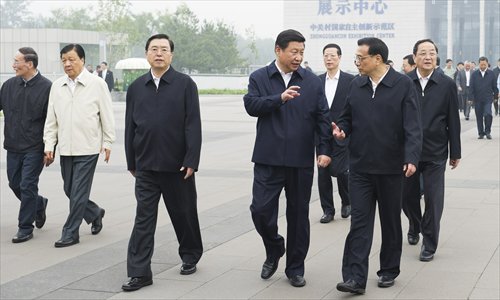HOME >> CHINA
Top CPC members start to study in more diverse ways
Source:Global Times Published: 2016-1-3 19:43:01

President Xi Jinping (fourth from left) and other members of the Political Bureau of the CPC Central Committee visit Zhongguancun, Beijing, as part of their 9th group study session on September 30, 2013. Photo: Xinhua
The way that the Political Bureau of the Central Committee of the Communist Party of China (CPC) studies has evolved from simply attending lectures given by experts, to include more diversified sessions including discussions, research and self-study.Attending lectures given by scholars and other experts was the main form of group study undertaken by members of the Political Bureau of the 16th and 17th CPC Central Committees, which lasted from 2002 to 2012. The change in content and form of the study sessions shows that the Political Bureau of the 18th CPC Central Committee has advanced with the times.
Diversified sessions
President Xi Jinping and other members of the Political Bureau of the CPC Central Committee took buses from Zhongnanhai - headquarters of the CPC and the State Council - to visit the innovation demonstration center in the Zhongguancun technology hub in Beijing on September 30, 2013. This was the 9th group session of the Political Bureau.
Xi and other leaders spoke to scientists and researchers in the fields of 3D printing, integrated circuitry and energy conservation, and asked about the development and application of nano materials, big data and biochip technology during the one-hour trip.
This was the first time a study session was held outside Zhongnanhai. The group session at the front line of the country's innovation industry reflects that the group study sessions of China's top leadership are now more flexible in both form and content.
The group study sessions of the Political Bureau of the CPC Central Committee began as legal lectures in Zhongnanhai during the 1980s. It was established as a formal system during the Political Bureau of the 16th CPC Central Committee, and the content was no longer limited to legal matters.
A total of 77 group study sessions were organized from 2002 to 2012, and 28 have so far been held for the Political Bureau of the 18th CPC Central Committee.
The change in study session form started at the first group session of the Political Bureau of the 18th CPC Central Committee on November 17, 2012.
The session was presided over by President Xi and aimed at studying the spirit of the 18th CPC National Congress. It was the first time since the study system was established that a session did not have any lecturers.
The 15th and 26th study sessions of the Political Bureau of the 18th CPC Central Committee developed new methods of self-study and exchanging views.
During the 15th study session about the market's decisive role in allocating resources, several members of the Political Bureau also made speeches on the topic.
Young lecturers
In the current sessions, young scholars born after the 1970s are increasingly taking the stage to give lectures to China's top leadership, who have an average age of 61.
In the 21st study session, the 44-year-old Huang Wenyi, a professor with the Jilin Academy of Social Sciences, lectured on deepening reform of the judicial system.
According to the Phoenix Weekly magazine, heads of ministries, provinces and cities attended the sessions as lecturers or key speakers in nine of the 28 group studies after the 18th CPC National Congress.
Zhu Lijia, a professor with the Chinese Academy of Governance, told the Phoenix Weekly that it's common for minister-level officials and young talents to lecture at Zhongnanhai.
He said that the central government selected lecturers based on the depth of their theory rather than their age.
"More young talents will walk into Zhongnanhai's study sessions as long as they have great academic attainments," Zhu said.
The group study sessions of the Political Bureau of the 18th CPC Central Committee touched topics that concern the public interest, such as the housing market. Some scholars said that closely connecting the sessions to the expectation of citizens showed that the current leadership is more pragmatic.
In the future, the group studies of China's top leadership will focus on studying the 13th Five-Year Plan (2016-20), Zhu said.
Phoenix Weekly
Newspaper headline: Powerful pupils
Posted in: Politics